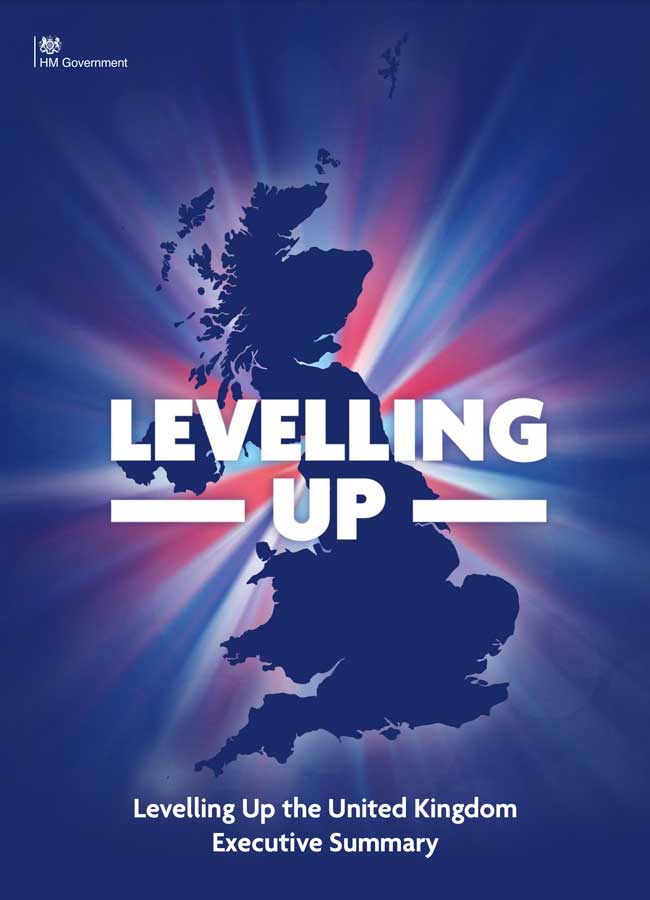Levelling up – the only game in town?
The “levelling up” agenda continues to divide commentators, but how much is rhetoric and how much reality?

GROWTH, REGENERATION & DEVELOPMENT
Image: Istock

James McHugh
Senior Consultant, Campbell Tickell

James McHugh
Senior Consultant, Campbell Tickell
Issue 67 | September 2023
Since UK voters last visited the ballot box in 2019, we have witnessed three prime ministers and five chancellors, a health pandemic, a major war in Europe, a cost-of-living crisis, and an England national football team winning a first major trophy in 56 years.
One constant on the political scene, however, has been debate around ‘levelling up’. This slightly fluid concept was central to the Conservatives’ 2019 election campaign. Described by former Prime Minister Boris Johnson as being “the defining mission” of his government, it presented an offer to areas of the UK experiencing significantly worse socio-economic prospects than the South East, London, and other thriving metropolitan areas. Much of this debate has inevitably focused on those so-called ‘Red Wall’ areas of the North and the Midlands, which continue to be haunted by the ghosts of deindustrialisation, with diminishing ties to the Labour Party and the greatest support for Brexit.
Reducing geographical inequality
Putting to one side its use as an election slogan, the concept of levelling up has a lot of merit. The UK has long-standing issues with regional inequality, which have been characterised as being far worse than any comparable advanced economy (IPPR, 2019). According to the latest available data, London and the South East accounted for almost 40% of UK GDP despite having just over a quarter of the population. The levelling up agenda intends to address this by reducing geographic economic, social and health inequalities across the UK.
This is the latest in a long procession of policy initiatives designed by Whitehall to tackle regional inequalities. The past decade alone has seen the rise and apparent fall of George Osborne’s “Northern Powerhouse”, Michael Heseltine’s 2012 “No Stone Unturned” review of regional growth, and the creation and now dismantling of Local Enterprise Partnerships. Prior to this, there was New Labour’s Regional Development Agencies.
Just rhetoric?
Levelling up has always faced the charge from some quarters of being little more than a rhetorical slogan. This was reinforced when almost three years passed before the publication of a 332-page government White Paper representing any semblance of a policy programme or structure.
Indeed, when this was published in February 2022 it drew widespread criticism for its seeming lack of coherence, originality, and perhaps most importantly, any significant new investment. Much of the White Paper appeared to read as a compilation of previously announced policies.
The Levelling Up Fund
Arguably the greatest driver of the agenda to date, has been the launch of the Levelling Up Fund, which has so far distributed almost £3.8 billion to 193 areas from Aberdeen to West Devon. The launch and administration of this fund has caused a lot of concern in the local government world. Some have criticised the opaqueness of how bids are reviewed and how it pits cash-strapped local authorities against one another. This approach was, to some degree, relaxed in the recent Budget, which awarded additional funds to nineteen previously unsuccessful bidders.
What is undeniable, however, is the extent to which the Levelling Up Fund has given a platform to the creativity and ingenuity that exists within local government across the country. Those benefitting from the funds are looking to build on or revitalise the assets of their communities and location to drive future growth in their areas. This is particularly evident in the North West, which represents by far, the greatest share of successful bids to date. There, councils such as Lancaster are planning a new Eden Project visitor centre at Morecambe Bay, while Blackpool, is creating a new “Multiversity” campus to offer courses in automation, robotics and artificial intelligence.
Although the levelling up policy remains controversial and fails to effectively compensate for wider programmes of austerity and diminishing economic productivity, it has incontrovertibly harnessed the energy of local government up and down the UK. It will be fascinating to see what’s in store for the next round of funding when it launches later this year.
“What is undeniable, however, is the extent to which the Levelling Up Fund has given a platform to the creativity and ingenuity that exists within local government across the country.”


